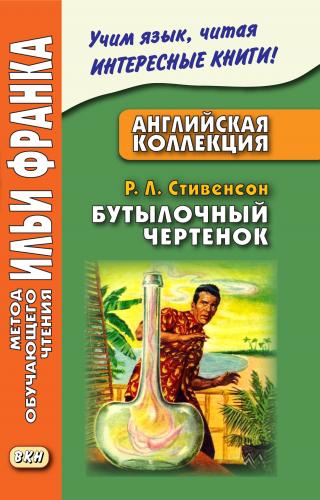heavily ['hevɪlɪ], shadow ['ʃædǝʋ], desire [dɪ'zaɪǝ]
“Of glass it is,” replied the man, sighing more heavily than ever; “but the glass of it was tempered in the flames of hell. An imp lives in it, and that is the shadow we behold there moving: or so I suppose. If any man buy this bottle the imp is at his command; all that he desires – love, fame, money, houses like this house, ay, or a city like this city – all are his at the word uttered.
Napoleon had this bottle (у Наполеона была эта бутылка), and by it he grew to be the king of the world (и с ее помощью он стал властителем мира; by – около, рядом; посредством, при помощи; to grow – расти; to grow to be smb. – делаться, становиться кем-л.; king – король; властелин, властитель); but he sold it at the last, and fell (но он продал ее в конце концов и пал; to sell; to fall – падать; пасть, погибнуть).
Captain Cook had this bottle, and by it he found his way to so many islands (капитан Кук владел этой бутылкой, и с ее помощью он нашел путь к такому большому количеству островов; to find); but he, too, sold it, and was slain upon Hawaii (но и он тоже продал ее и был убит на Гавайях; to slay – убивать, умерщвлять).
For, once it is sold, the power goes and the protection (потому что, как только она продана, власть уходит, и защита /тоже/); and unless a man remain content with what he has, ill will befall him (и если человек не довольствуется: «не остается довольным» тем, чем он владеет, его постигнет беда; to remain – оставаться; оставаться в каком-л. состоянии; ill – зло, вред; несчастье, невзгоды, беды; to befall – случаться с кем-л., выпадать на чью-л. долю).”
Napoleon [nǝ'pǝʋlɪǝn], Hawaii [hǝ'waɪɪ], power ['paʋǝ], content /прил./ [kǝn'tent]
Napoleon had this bottle, and by it he grew to be the king of the world; but he sold it at the last, and fell.
Captain Cook had this bottle, and by it he found his way to so many islands; but he, too, sold it, and was slain upon Hawaii.
For, once it is sold, the power goes and the protection; and unless a man remain content with what he has, ill will befall him.”
“And yet you talk of selling it yourself (и все же вы говорите о том, чтобы самому продать ее)?” Keawe said.
“I have all I wish, and I am growing elderly (у меня есть все, чего я желаю, и я старею: «становлюсь пожилым»),” replied the man (ответил мужчина). “There is one thing the imp cannot do – he cannot prolong life (есть одна вещь, которую чертенок не может выполнить: он не может продлить жизнь); and, it would not be fair to conceal from you (и было бы нечестно скрыть это от вас; to conceal – прятать, укрывать; скрывать, утаивать), there is a drawback to the bottle (есть изъян в этой бутылке); for if a man die before he sells it, he must burn in hell forever (если человек умрет прежде, чем продаст ее, он будет: «должен» гореть в аду вечно).”
prolong [prǝ'lɒŋ], fair [feǝ], conceal [kǝn'si:l]
“And yet you talk of selling it yourself?” Keawe said.
“I have all I wish, and I am growing elderly,” replied the man. “There is one thing the imp cannot do – he cannot prolong life; and, it would not be fair to conceal from you, there is a drawback to the bottle; for if a man die before he sells it, he must burn in hell forever.”
“To be sure, that is a drawback and no mistake (нечего сказать, это /действительно/ изъян, никаких сомнений: «и никакого заблуждения»; sure – уверенный; to be sure – конечно; вот те на, однако; mistake – ошибка; заблуждение; and no mistake – несомненно, бесспорно, будьте уверены),” cried Keawe (вскричал Кэаве). “I would not meddle with the thing (я не буду связываться с этой штуковиной; to meddle – вмешиваться, соваться не в свое дело). I can do without a house, thank God (я могу обойтись без дома, слава Богу: «благодарение Богу»; to do – делать, производить действие; довольствоваться, обходиться); but there is one thing I could not be doing with one particle (но есть одна вещь, которой я не могу удовольствоваться ни на йоту: «частицу»), and that is to be damned (и это – быть осужденным на муки ада; to damn – проклинать; /церк./ осуждать на муки ада; damned – /эмоц. – усил./ отвратительный, ужасный; окаянный, проклятый).”
sure [ʃɔ:; ʃʋǝ], drawback ['drɔ:bæk], particle ['pɑ:tɪkl]
“To be sure, that is a drawback and no mistake,” cried Keawe. “I would not meddle with the thing. I can do without a house, thank God; but there is one thing I could not be doing with one particle, and that is to be damned.”
“Dear me, you must not run away with things (Боже мой, вы не должны настолько забегать вперед: «увлекаться событиями»; to run away – убегать, удирать;
